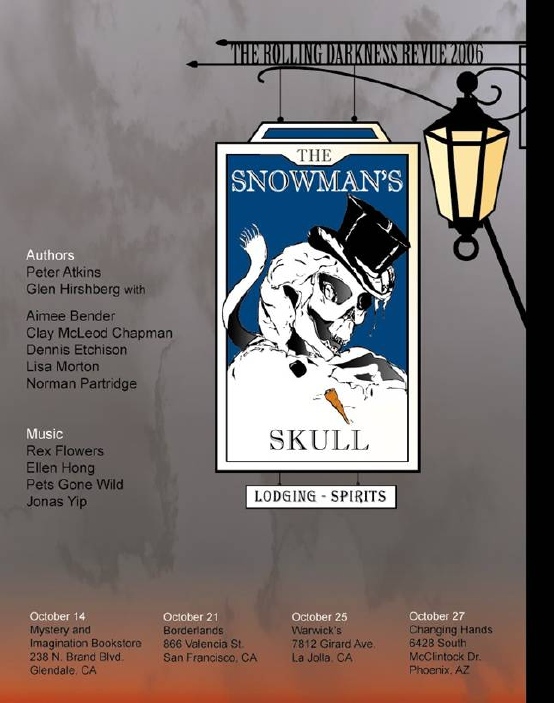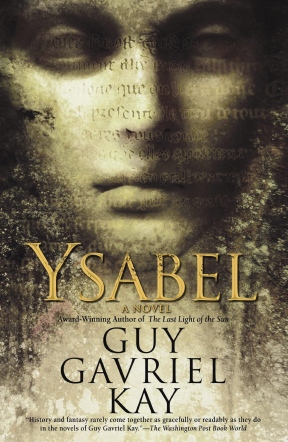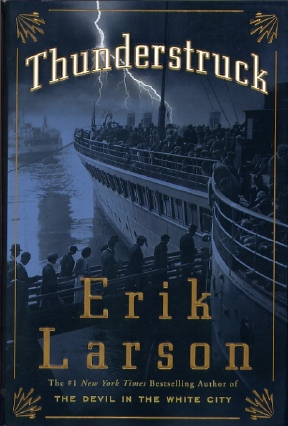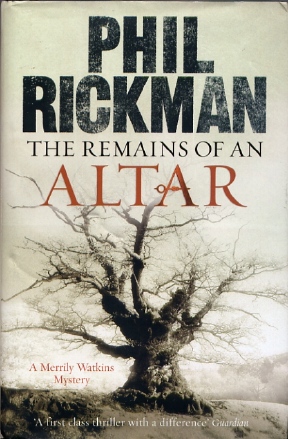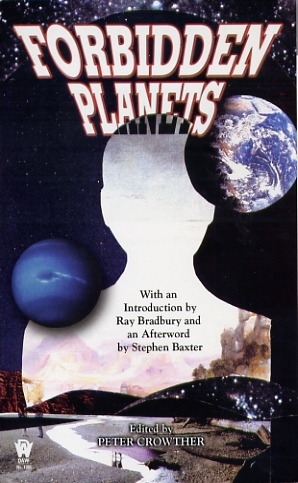|
|
|
This Just In...News from the Agony Column
|
10-22-06: NPR Link for Rolling Darkness Revue Story |
|
| Email
this link To my mind, this is my best NPR story yet. And I have to thank the NPR staffer who did such a great job gathering audio at the opening show in the tour. But enough about me...here's the story. Enjoy it, the guys and the gal -- Glen Hirshberg and Pete Atkins of Rolling Darkness Revue and my folklore expert, Doctor Leslie Ellen Jones, totally rock. So, give it a listen, and then email it. I know, the RealAudio format is not ideal, but I'll podcaqst the finished version next week. In the interim, please understand that NPR looks very closely at their stats with regard to the most emailed story, so I'd appreciate your help here. Thanks again folks, to the NPR staff and the subjects themselves who made this possible. And now the link: http://www.npr.org/templates/story/story.php?storyId=6362633 Have at it readers, I think these guys are going to be stars soon enough. This is a fantastically well-conceived combination of literature and music. What more could you ask? This show could very easily translate to the big, big time, because it is just so much fun. See it now while it's small and esoteric -- qand mostly because it is fun. |
|
10-20-06 Updated |
||
Rolling
Darkness Revue Coming to Town and Weekend Edition Sunday
This is literally
just in...with luck and a relatively slow news weekend, readers and
listeners
will get a chance to hear my article on this year's edition of the Rolling
Darkness Revue, this weekend on Weekend Edition Sunday. It's a look at
the guys and includes some fascinating stuff from Dr. Leslie Ellen Jones
on how our physiological reaction to fear helps make learning easier.
I'm told and that the segment will air in the second hour, in the second
part
of the B segment (not in the usual arts end of the hour location…) Let
me hasten to say that there is always the potential to get bumped, but
in that event I can Podcast the report (I believe, I have the audio).
And let me take a moment to thank my extraordinary editors at NPR who
helped me through this most entertaining process. They rock, each and
every one of them. |
|
10-20-06: Guy Gavriel Kay Discovers 'Ysabel' |
|||
From
Fantasy to Slipstream
One of our sharpest fantasists, Guy Gavriel Kay, ('The Last Light of the Sun') is making the cut to mainstream fiction, but in honor of his fantasy past, we'll call it slipstream, so as not to alienate his current readers. His new novel 'Ysabel' (Roc / Penguin Putnam ; February 6, 2006 ; $24.95) is the kind of book I have been hoping to see from this talented writer. It offers him the chance to create a work that is utterly, immediately accessible to a much wider audience than he might normally reach. Encompassing current day thriller, current day romance and current day horror, with enough of a historical infusion to bring his talents in this realm to life, 'Ysabel' seems ideally suited to spread to a wider-than-genre audience. Now, one never knows if this will happen, but at least a book like this suggests that it can happen. But really, that's all beside the point. This contemporary novel with overtones of the fantastic from a fantasy writer would be on my short list in any event. The real question for 'Ysabel' is pretty familiar. Where will it be shelved? The premise offers it the opportunity, at least to be put right alongside mainstream fiction novels. 'Ysabel' unfolds as Ned Marriner, in France with his father, explores the Saint-Sauveur Cathedral in Aix-en-Provence. Like many a fictional guy on vacation in Europe, he meets a girl. (Actual guys on vacation in Europe hoping to meet girls are more likely to meet bedbugs.) Ned and Kate explore the ruins and find themselves face to face with an odd-looking gent carrying a knife, and before you can say 'Mythago Wood', they're embroiled in a legend that is playing out in a place where the deep past and the wounded present collide. It's not uncommon that conflicts from the past play out in the present, it is the nature of all wars to repeat themselves; old battles with new flags. But romantic conflicts don’t have that kind of open history of repeating. Nor do they generally involve the invasion of the present by the past. What makes 'Ysabel' so exciting to me is that it gives Kay a chance to deploy his considerable world-building chops in the service of building a vision of our world infected by the past. Of course, our world is already infected by the past, but not quite in the fantastic manner that Kay depicts here. His deep knowledge of how history creates societies and societies create individuals gets put on a stage and in a novel that any reader might pick up and enjoy. Not that any reader wouldn't probably enjoy one of his fantasies, but they’re shelved, over there with the books that got elves on 'em. With luck, we'll see bookstores shelving 'Ysabel' next to titles by Dean Koontz and Stephen King. It bears more than a passing resemblance to titles by both of these authors, though the intent here is not to scare the reader but rather to enchant with possibility. As for me, I'm just enchanted that Kay decided to move in this direction. I'm pretty certain his sizable fantasy fan base will follow, and those who read this column should both be aware that his novel may not get ghetto-ized and be happy that it may not get ghetto-ized. They ain't no sissy elves in this book. Just, well, if not manly men, at least guys who wear blue jeans. Guys who might buy a book like 'Ysabel', not because it is or is not of some genre or fits some pre-conceived notion of what a book should be. Guys and gals for that matter, who would buy this book because it looks to be well-written, tinged with imagination. A book you can read and get lost in. |
|
10-19-06: Eric Larsen is 'Thunderstruck' |
|||
Marconi,
Murder and Magic Science
But of course, we were not always a connected nation, a connected world. There was a time when we crossed that line, however. But it wasn't just, as you might think, a nebulous span of years. Our connected world, it turns out has a very specific and spectacular birthday. Who better to chronicle that day than Erik Larson, author of 'The Devil in the White City'. Larson is master of a very peculiar but very entertaining fusion of history and crime non-fiction. He burrows to the heart of an age or a moment in an age when the levers flip, when the doors open, when we step from one world to another. 'Thunderstruck' (Crown / Random House ; October 24, 2006 ; $25.95) tells the story of our first step into a connected world, a powerful story of crime, passion and science that seemed to be more magic than matter-of-fact. As with his previous book, Larson weaves together the story of a killer and a genius, which as improbable as it might sound, once again manages to work quite brilliantly. In fact here the ties are much closer than in 'The Devil in the City'. Let me be clear about the sort of history that you can expect from Larson. He writes narrative histories that read more like novels than textbooks, though he assures us that, "anyone doing a Ph.D. can cite my books with absolute confidence." The upshot of this for a read, however, is that reading 'Thunderstuck' is very much an immersive, novel-like reading experience. The story here involves a murderer, Edward Crippen, accused of killing his shrewish, cheating wife and fleeing with his teenaged secretary from his home in England to America. Alas, he had the misfortune to book passage on a ship that contained a miraculous, almost magical piece of technology invented by one Guglielmo Marconi. When Marconi first created his invention, our understanding of science was at such a state that many considered it simply balderdash; communicating through the air? The realm of those spiritualist charlatans, of psychics and fakirs. And thus does Charles Fort's assertion that science has its fashions as much as society seem so much clearer. These days, the psychics trot out quantum entanglement to explain telepathy, telekinesis and precognition. You couldn’t hope to set up a better set of mirrors, but it still would not help you parse the truth from the flim-flam. Meanwhile, back in the gas-lit Edwardian age, Larson drenches his scenes in atmospheric telling details, and propels the plot of his book at pace that belies its non-fictional nature. 'Thunderstruck' really does shine the spotlight on the birth of Our Connected World, though I'll let you discover how. (So long as you refrain from reading that overly-chatty dust jacket.) But then I suppose this is history, and it is not necessarily a book you read just to find out what happens. It's the journey that counts, those first hesitating steps, driven by fear, by genius that took us on the path to our world, our murky web of intrigue and lies. As with all great book it does make you wonder what sort of world is being born now, and where? Where will someone look, one hundred years hence, at which genius, at which murderer, to observe the birth of our future? |
|
10-18-06: Merrily Watkins Seeks 'The Remains of an Altar' |
|||
Phil
Rickman Returns
Few writers have the facility to do this, to offer satisfaction on so many levels, as Phil Rickman. His Merrily Watkins mysteries work on a variety of levels, from the simple satisfaction of following the lives of characters we care about to the diffuse delight that results from an encounter with the ineffable. Rickman's novels are full of the stuff of life and that beyond life. He's one of the best writers to straddle the line between the surreal and the super-imposed, to portray the clash between the perceived and the actual. Rickman's novels are the kind we savor, read slowly. They're reasons to welcome the fall, the chills of October and what follows. 'The Remains of an Altar' (Quercus ; October 7, 2006 ; £14.99) is the latest novel from Rickman and his first under a new publisher, Quercus. No worries on the publishing front; Quercus has perfectly preserved the look and feel of Rickman's previous Merrily Watkins novels, and the paper / printing is pristine. That's important, because when you're reading a Phil Rickman novel, you want nothing between you and the prose. Mission achieved in that regard. You have a perfect book before you, full of words...and music. 'The Remains of an Altar' finds Merrily Watkins in Wychehill, investigating automobile accidents that some claim to have a paranormal dimension. But Wychehill is home to those obsessed with Edward Elgar and The Dream of Gerontius, an evocation of the afterlife with angels and demons. Of course there are more earthly aspects to Merrily's journey as well. The ever-changing face of the Malverns, under assault by developers, besieged by newcomers seeking the views and home to families who have been part of the land for generations. That landscape is inhabited by a complex confection of human beings, each with discrete desires, destinations, plans and prevarications. It is a web so complex it might as well be supernatural. And therein lies the key to why I find Rickman's Merrily Watkins books so enjoyable. Rickman uses a dense, intricate prose style to plunge the reader in a world complicated by the emotions and perceptions of his characters, complicated to the point where it's difficult to establish just what is real and what is felt. His plots grow and multiply like the roots of trees; they seem organic and natural, powerful and subterranean. His dialogue is witty and perfectly balanced within the narrative, something that is not often noticed about a book. That is, Rickman provides enough dialogue to keep the reading easy, to keep the plot moving, but not so much as to unmoor the book from the rich atmosphere Rickman creates. And finally, each Rickman novel has its factual basis. In this sense, Rickman's novels, though they all unfold in a contemporary setting, have a large dose of the historical novel embedded. Here it is the life and work of Edward Elgar. Rickman offers up about three pages of references and thanks to those who provided them, so one can rest assured that he's done his homework thoroughly enough so as to ensure it will not seem like homework to the reader. What Rickman does is to filter his research through his aesthetic sensibility, a sensibility honed in the Malvern Hill, rich with mystery, legends, and the supernatural. To me, it's interesting to contemplate what Rickman is achieving with his Merrily Watkins mysteries. He's creating the fictional equivalent of the landscape and history that he writes of. Each novel adds a new layer to the returning characters, including the returning character of the landscape itself. 'The Remains of an Altar' heralds the arrival of winter, the promise that the world shall be concealed within words and revealed by reading. |
|
10-17-06: Peter Crowther Celebrates 50 Years of 'Forbidden Planets' |
|||
A
Mass Market Paperback Must-Buy
So what does Peter Crowther, at the helm of the delightfully deluxe PS Publishing, have to do with the often-sordid world of MMPBs? Well, in his copious spare time, he edits theme anthologies for DAW (long may they rule the grocery store racks) and his latest book featuring an unspeakably cheeseball cover is 'Forbidden Planets' (DAW / Penguin Putnam ; November 7, 2006 ; $7.99). How good is this book? Well, I have read and reviewed every author in this book (but one) and loved each and every one of them. Each story in here in original to the anthology. You can't ask for much more than that, beyond specifics, Rick, specifics. 'Forbidden Planets' is a series of paeans in short story form to the classic movie 'Forbidden Planet'. Here's my special tie to that movie: when I reviewed 'Accelerando' by Charlie Stross for the Metro Santa Cruz and Metro San Jose, one of the readers was so impressed by the book and the review that he sent me a DVD of the movie, as he thought the themes relevant. It is moments like these that make reviewing worthwhile, when you connect with a reader who really, really gets it and gets their mind stretched in the best possible fashion. Well, this is the 50th anniversary of the release of the movie 'Forbidden Planet' and Crowther, who confesses in the story notes that, "It's one of those films I could watch over and over again," thought an anthology with stories about planet where "humans should not venture but do" would be the best vehicle with which to celebrate. And I'll not argue with him, not when he can draw in a crowd of writers as good as those here. We’re talking: Matthew Hughes ('Black Brillion'), Jay Lake ('Green Grow the Rushes Oh'), Paul McAuley ('The Secret of Life'), Paul Di Filippo, Alastair Reynolds, Stephen Baxter ('Coalescent'), Chris Roberson, Scott "SciFI.com" Edelman, Ian McDonald ('River of Gods'), Michael Moorcock, Alex Irvine ('A Scattering of Jades') and Adam Roberts. For me, almost any one of these guys would trigger a $7.99 buy reflex, but all of them, together? Even that cover can't scare me off! The theme is also quite interesting to me, offering as it does, a chance for our favorite writers to trundle out a set of decent monsters. Matt Hughes brings out Luff Imbry in 'Passion Ploy', and Paul Di Filippo struts his humorous stuff with 'The Singularity Needs Women!' I'm guessing he's really right about that. Also of note in terms of title only is Adam Roberts, always the wit, with: 'Me-Topia'. Now that's no science fiction concept. I know plenty of people who seem to live in me-topia. Here's how you identify such a human. Engage them in conversation. If after, say ten minutes, the preponderance of your contribution to the conversation consists of, "Uh-huh," "Right, right," and "Absolutely!" then you have just entered me-topia. Good luck getting out. If you are on the receiving end of such a conversation, that is, if all you are hearing is the above, well, time to consider the phenomenon of the black hole as it pertains to enormous human egos. We all have our own personal event horizon, and if nothing gets out of yours then consider a course in active listening. Of course I'm sinking below my personal event horizon with all this verbiage when all I'm supposed to be say is buy this damn book immediately, especially if you hate science fiction and the cover gives you the heebies. When you read stories that prove to be surprisingly great in such an unprepossessing package, then perhaps you'll find yourself with a whole lot more literature worth reading. And respect for a branch of literature that you might heretofore have thought was er, trash. One man's... These writers are all treasures. This book, as the kids would say, "rocks". Or is that what they would say? I never know. Time passes so fast. You look up and there's another Peter Crowther anthology and you think: Damn, that cover hurts my brain. |
|
10-16-06: An Interview With Amir D. Aczel |
||||||
The Bourbaki New Math Hoax Exposed!
Having read Aczel's illuminating history of 20th century math, I can now safely toss all those misconceptions aside. By shining the light on one little corner, he illuminates an entire world, and he offers readers a cast of characters who are compelling, quirky and complex. I could lay out the whole thesis of this book much better now, having spoken with Aczel last week, but readers will be much better off hearing the author do so himself. We don't actually spoil the book, but rather illuminate it for the reader, which was simply the result of spontaneous conversation about a subject we both loved. Aczel's a brilliant man who gets between the cracks of history to show us mad mathematicians hiding in the French Pyrenees and children of privilege reliving their college pranks writ large across the entire world of mathematics. The
Think of this as an academic version of That Book, the power of which has been defanged, thank-the-publishers-that-be, by a bad movie. The story is just as jaw dropping, the characters just as eccentric. Download the RealAudio version of the interview if you must, or subscribe to my podcast via this link, or just download the MP3. Rewind to the dawn of the last century, and witness the mathematicians of Europe being decimated by two world wars. You know, I always think of war as having a rather positive effect on technological and scientific progress, but that conclusion is obliterated by reading this book. There is no clockwork math. There are only people, scribbling, meeting, trying to figure stuff out. Trying to make a name for themselves. Even though that name is not their own, or the name of any actual man. Math has an identity of its own. You can call the math you know Nicolas Bourbaki. |
